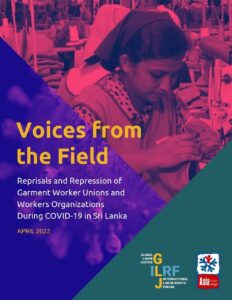Colombo, Sri Lanka (April 11, 2022) – A new report released today by the Asia Floor Wage Alliance (AFWA) and Global Labor Justice-International Labor Rights Forum (GLJ-ILRF) details how Sri Lanka’s largest garment manufacturer Brandix Lanka and the government cracked down on unions after they spoke out about a COVID-19 superspreader event in a free trade zone outside of Colombo.
The outbreak in October 2020, in which thousands of garment workers and people in the surrounding communities were infected, followed a concert that Brandix management hosted in clear violation of COVID-19 protocols.
Based on interviews with unions, workers’ rights organizations and garment workers, the report, ‘Voices from the Field: Reprisals and Repression of Garment Worker Unions and Workers’ Organizations during COVID-19 in Sri Lanka’ shows that Brandix violated government COVID-19 guidelines in the days before the superspreader outbreak that infected 1,000 of the 1,400 workers at the factory. The outbreak – one of the country’s largest — would sicken thousands more in the region, especially garment workers, who themselves were blamed for the outbreak.

When the garment workers – who are largely women – and the women-led unions and workers’ rights organizations that support them spoke out publicly about Brandix’s responsibility for the outbreak, Brandix and the Sri Lankan government, police and military escalated a campaign of reprisals and repression against them.
“This report is a striking example of how unions in Sri Lanka are being policed — kept out of the free trade zones by the government and threatened with arrest if they speak out on behalf of garment workers,” said Sahiba Gill, Staff Attorney at GLJ-ILRF. “It is inhumane and illegal for governments and companies to bully unions and workers to deny them their fundamental rights.”
The retaliation by the Sri Lankan government and military includes public threats and police searches of garment sector trade unions and workers’ rights organizations, police searches of union leaders’ homes and the head of the Sri Lankan Army threatening unions on TV.
“Unions have been the frontline responders to garment workers during COVID-19 ensuring their rights are respected. Yet the government has threatened us for this work rather than supporting us,” said Chamila Thushari of Dabindu Collective Union.
Despite the well-documented breaches of COVID protocols at the factory, Brandix has denied wrongdoing in causing or worsening the outbreak.
“Reprisals and retaliation have interfered with accountability for the Brandix outbreak and the abuse and harassment of women garment workers that followed. These unions are being pressured to keep silent,” said Wira Ginting, Deputy International Coordinator for Asia Floor Wage Alliance.
Brandix has also denied unions access to its worksites and told workers that there will be no unionization at their factories.
“If unions had been granted access to Brandix factories, we would have monitored Brandix compliance with COVID-19 requirements — and the Brandix outbreak may never have happened,” said Ashila Niroshine Mapalagama of Stand Up Workers Union.
“When garment workers spoke out after the Brandix outbreak, we amplified their voices so those responsible could be held accountable. Our rights to freedom of speech and association should be respected,” said Chandra Devanarayana of Revolutionary Existence for Human Development (RED).
“Freedom of association is a fundamental right and we will work with Sri Lankan unions and global allies to ensure Sri Lanka protects that right and Brandix respects it,” said Jennifer (JJ) Rosenbaum, Executive Director of GLJ-ILRF. “We are committed to supporting workers’ rights in the global supply chain and to ensuring garment makers and the world’s largest retailers are held responsible for providing humane, fair and livable conditions for the workers who make the world’s clothing.”
GLJ-ILRF and AFWA are calling on the government of Sri Lanka and Brandix to respect freedom of association and engage in dialogue with women-led trade unions.
Sri Lanka’s garment industry represents 40% of its exports, a critical source of foreign currency for the country. Foreign currency shortages are a contributing factor in the current economic crisis, the worst in Sri Lanka’s post-independence history.
Asia Floor Wage
